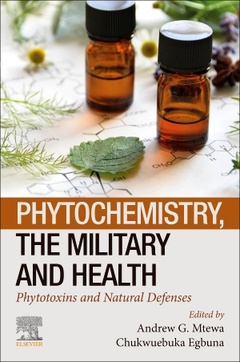Phytochemistry, the Military and Health Phytotoxins and Natural Defenses
Coordonnateurs : Mtewa Andrew G., Egbuna Chukwuebuka

Phytochemistry, the Military and Health: Phytotoxins and Natural Defenses comes as a response to the gap that there has for so long existed between phytochemistry and survival of both service personnel and civilian communities during and after conflicts. Armed conflicts cause a lot of devastation to communities and should be avoided as much as it can be possible. The devastation is usually evident in service provisions such as Health, Education, Water, and Food among many others. Both service personnel and civilians are affected to various degrees. Facilities usually end up being physically destroyed, with no essential supplies and/or having dysfunctional systems. Going with untreated wounds, communicable and non-communicable diseases for weeks with no medical interventions due to the conflicts, disease burdens heavily weigh down on communities as well as security personnel. To make the situation even more complicated, masses of people are forced to migrate for safety and security reasons, likely going with diseases along wherever they go. In such instances, phytochemicals become handy in providing solutions from first aid, basic analgesia, antimicrobials, and the general improvement of health.
Phytochemicals are known to play a major role in the day to day management of diseases and health. There has been much research into their effectiveness as community medicines and as alternatives to conventional drugs. However, the role that phytochemicals play in the military, counterterrorism, and security has been overlooked. Phytochemistry, the Military and Health: Phytotoxins and Natural Defenses discusses the roles that phytochemicals play as friends and foes in the military, including insights aimed to help develop antidotes against phytochemicals and other chemical agents used maliciously as weapons. Filling a gap between drug discovery, security, and emergency medicine, this book describes which plants can be categorized for protection and controls, which can be helpful in times of conflicts and soon after conflicts, in military operations, and those that can be used as deterrents and as emergency medicines. Carefully designed to show the contribution that phytochemicals play in safety and security, this book is useful for researchers, regulators and anyone interested in plant chemistry.
1. Introduction to phytochemicals and the military
Part A: Uses and historical perspectives of plants and their chemicals 2. Historical use of plants in warfare 3. Importance of forests to the military beyond physical training 4. Phytochemicals used in body agility and remediation from tissue mutilation 5. Important histaminic and antihistaminic plants and their potential role in military operations 6. Plants as warfare strategic tools 7. Phyto-therapy against conflict related trauma 8. Important plants in emergency military surgical procedures 9. Potential wartime phyto-sedatives for the field 10. Useful plants and phytochemicals for wound healing and physical fitness 11. Emergency phytomedicine during armed conflicts
Part B: Plants and phytochemicals used as therapeutics 12. War and conventional plant-based drug development 13. Development of phyto-antidotes against chemical agents 14. Molecular optimization of phytochemicals into weapons and antidotes
Part C: The good and adverse sides of phytocompounds 15. Important military amphibious phytotoxins 16. Classes of phytochemical weapons 17. Phytochemical based nano-particles as military foes and friends 18. Nanotechnology-targeted herbal drug delivery as fast and efficient antidotes against systemic poisons 19. Terrorism, counter-terrorism and phytochemicals
Part D: Mechanistic approach to phyto-chemical weapons 20. Chemical and pharmacological mechanisms of nerve agent poisoning 21. Mechanisms of phytochemicals as antidotes to chemical weapons 22. Application of metabolomics in emergency phytochemical poisoning and remediation
Part E: Management, protocols, regulation and future perspectives of phytochemicals 23. Laboratory protocols on handling phytochemical warfare agents 24. Detection and identification of phytochemical weapons 25. Management and regulation of potential weaponizable plants 26. All-plant emergency first aid kits innovations 27. The future of phytochemicals in the military 28. Conclusions
His main area of interest is drug design and development using medicinal chemistry aspects and various computational and synthetic techniques to obtain logical hits to leads for particular biological targets from synthetic scaffolds in various libraries, de novo as well as from natural products. He did his MSc degree in Applied Chemistry (Natural Product Chemistry). He has a passion to coach and train upcoming drug discoverers to search for drugs beyond plant extracts to compound level towards optimization.
Before joining the academia, Andrew served in various portfolios including but not limited to being Quality Assurance Manager for Valid Nutrition’s therapeutic foods’ factory, assistant Quality Manager (Shifts controller) for Alliance one international tobacco processors and graduate trainee for the Japanese Tobacco International (JTI), Malawi factory. He founded Leptons Scientific consultants in 2011 and has provided consultancy services in his areas of expertise to various clients. For close to a decade now, Andrew has also been researching military strategies, security and weaponry among others. He studied intelligence analysis and is trained in H2H close combat.
He has published various journal artic
- Covers the contribution that phytochemicals play in safety and security
- Contains insights that will help in the development of antidotes against phytochemical and other chemical weapons
- Categorizes plants in terms of their usefulness as well as the potential security risks they possess
Date de parution : 03-2021
Ouvrage de 606 p.
15x22.8 cm


